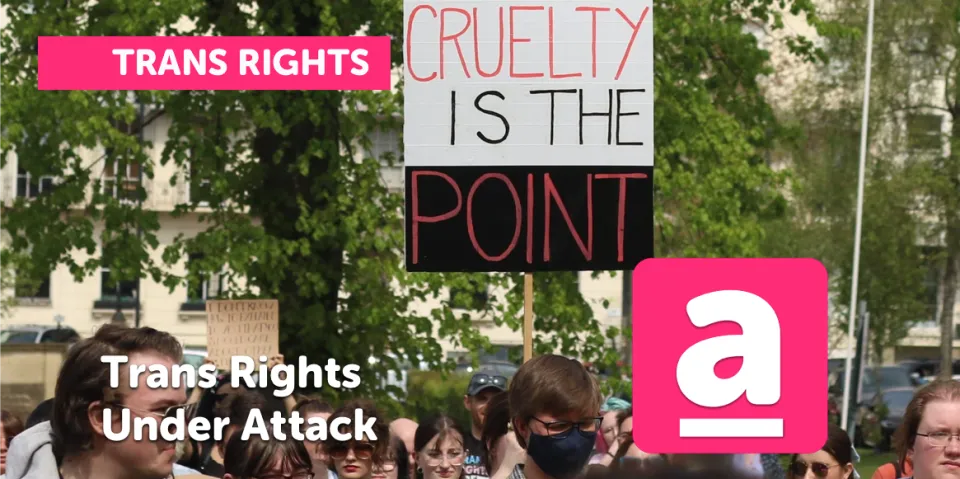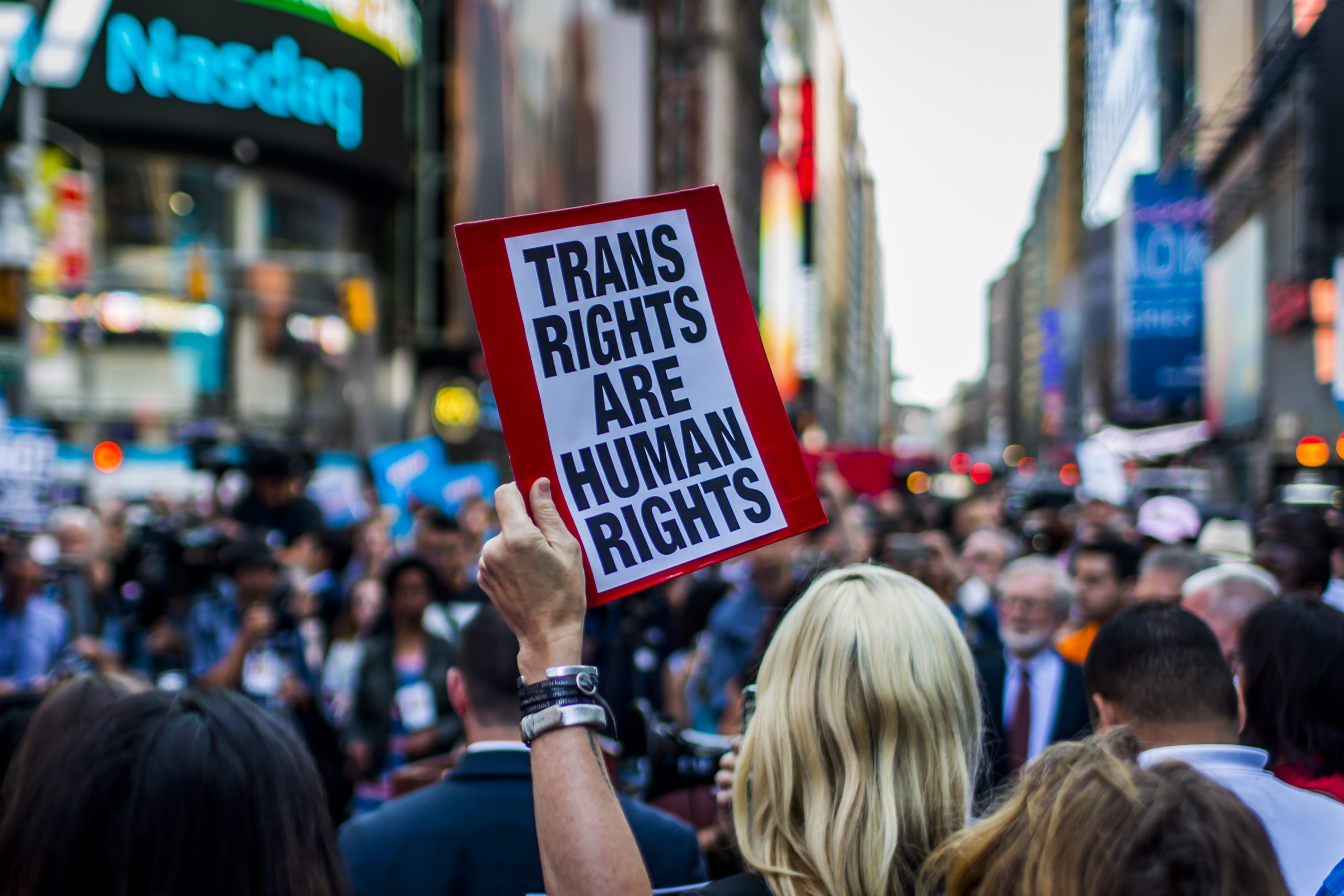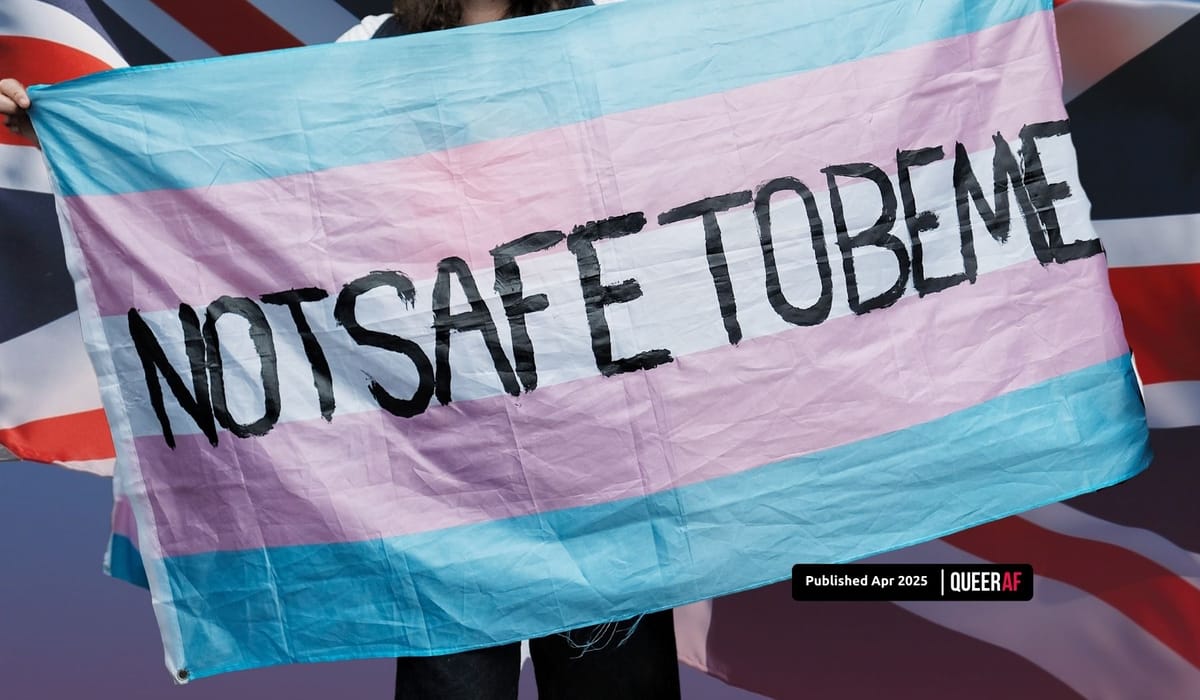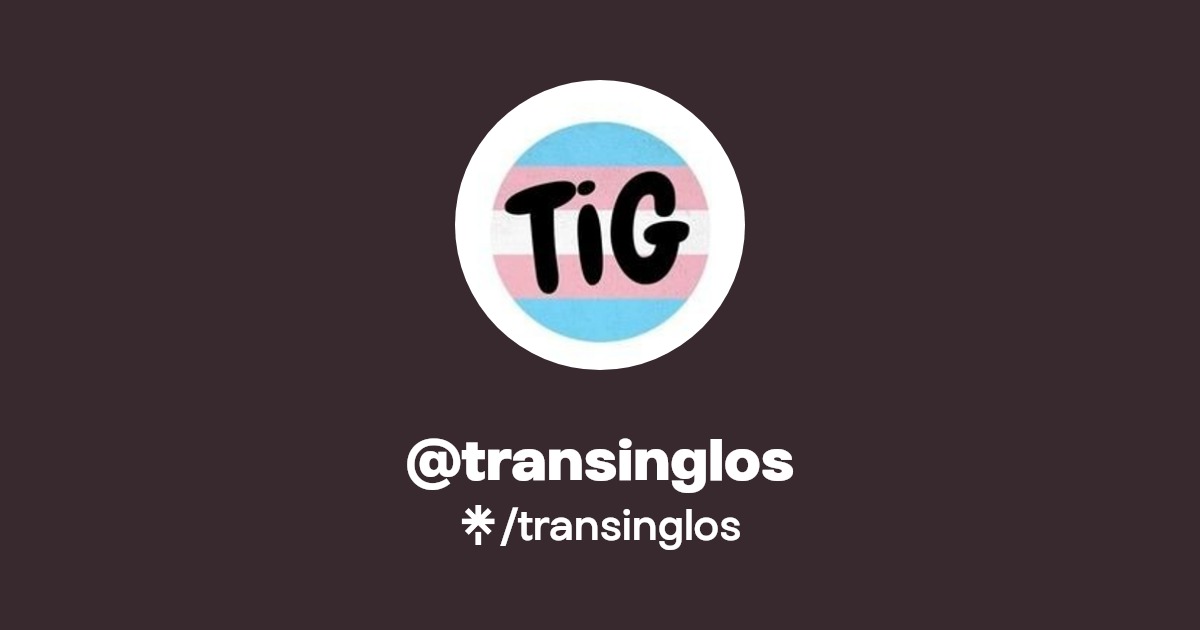Trans rights under attack: The Supreme Court, the EHRC guidance, and what we can do about it

On 15 April 2025, the UK Supreme Court ruled that 'women' and 'sex' in the 2010 Equality Act refer only to cisgender 'biological women'. The ruling effectively removes transgender women's sex-based protections as women, and opens the door to blanket bans on transgender people in single-sex spaces.
The ruling has unleashed jubilant celebrations by the British press and anti-trans campaigners, and outpourings of anxiety and grief among transgender communities. Legal experts say the practical implications of the ruling rob trans people of legal protections in almost all spheres of life, and mean the UK is close to implementing trans segregation policies that are "the most severe in the Western world".

In this long-read explainer, Amplify Stroud attempts to break down the ruling and subsequent guidance, what it means, and how to fight it.
Disclaimer: We are not legal experts and this is not legal advice. If you'd like to raise any queries or concerns, email [email protected]
What was the Supreme Court ruling and why is it controversial?
Background to the ruling
The case was brought by campaign group For Women Scotland, which wanted to ensure trans women with Gender Recognition Certificates (GRCs) were excluded from the Gender Representation on Public Boards (Scotland) Act 2018. They wanted to make sure that 'women' as a protected class under the Equality Act 2010 only refers to cisgender women.
Gender Recognition Certificatess allow transgender people to be legally recognised as the gender they live as. Obtaining one is a lengthy process requiring legal and medical evidence submitted to an independent board. Having a GRC means a transgender person can update the sex on their birth certificate, allowing them to get married in their correct gender, among other things.
GRCs were created by the Gender Recognition Act 2004, which was the result of a European Court of Human Rights (ECtHR) ruling that found the UK was in breach of its human rights obligations by not allowing trans people to update legal documents. This was found in Goodwin v UK (2002), where a British transgender woman successfully argued her Article 8 human right to privacy was undermined because her 'male' national insurance number led to her being identified as trans and subject to harassment and discrimination at work.
What did the Supreme Court say?
Now, the Supreme Court has ruled that even with a GRC, trans women are "biologically men" and should be excluded from spaces, services and initiatives designed for women. Previously, trans people could only be barred from single-sex spaces if it was deemed "a proportionate means to a legitimate end under the Equality Act."
The Supreme Court claimed that the judgement is not "a triumph of one or more groups in our society at the expense of another." Lord Hodge added that under equality law, transgender people still have:
"...protection, not only against discrimination through the protected characteristic of gender reassignment, but also against direct discrimination, indirect discrimination and harassment in substance in their acquired gender".
However, by permitting transgender people to be excluded from single-sex initiatives as a matter of principle, the ruling represents a huge blow to trans rights in Britain. As transgender barrister Crash Wigley has explained:
The Equality Act’s aims include: protecting trans people from anti-trans discrimination, harassment and victimisation [and] eliminating discrimination against trans people
None of the above can be achieved unless trans people have some legal rights to be treated in accordance with our gender identity. Trans people have no dignity, respect or privacy in a society where we are prevented writ large from using single-sex spaces as we go about our daily lives, or where we are regularly subjected to challenges from strangers about our gender.
As a legal regime, it erects large and unnecessary barriers in the way of trans people’s full and equal participation in public life. It is an affront to equality.
The Supreme Court has been heavily criticised for refusing to allow any transgender advocacy groups or trans legal professionals to present evidence before the court. Victoria McCloud, a transgender judge barred from presenting evidence without explanation, is now appealing directly to the European Court of Human Rights on the basis of a lack of a fair trial. 'Feminist' anti-trans campaign groups were allowed to present written and oral evidence at length. As Professor Jennifer Piscopo explains:
"The Court's ruling relied extensively on arguments presented by trans-exclusive ('gender critical') activists, while notably excluding any direct input from trans voices themselves."
What is the impact of the ruling?
The Court's ruling that transgender people with GRCs remain their 'biological sex' for the purposes of equality law effectively undermines almost all the benefits and protections of legal gender recognition for trans people.
The Supreme Court ruling means transgender women could be turned away from rape crisis centres, homeless shelters or women's hospital wards, or denied the chance to benefit from schemes or initiatives designed to help women. The judgment also stipulates that they could be turned away from men's facilities as well due to their female appearance.
Trans advocates have said this created further degradation of transgender women and restricts their ability to access services and support that they often need. Research shows that trans women are more likely than cis women to be victims of sexual violence, domestic abuse, violent crime, homelessness, drug addiction and survival sex work. For both transgender women and cisgender women, the vast majority of intimate physical and sexual harm is caused by cisgender men.
According to Amplify Stroud's own analysis, this may mean the UK now has poorer legal gender recognition rights for transgender people than almost all countries in Europe and South America, as well as Botswana, Bhutan, Pakistan and Nepal.
The Netherlands-based NGO Trans Rescue says they've been supporting hundreds of transgender British people attempting to leave the UK as refugees under human rights law, and they've seen a "40-fold increase" in applications for support since the ruling. In 2017, a British transgender woman was granted residency in New Zealand after it was found it was "unduly harsh" to return her to the UK, where she had suffered "years of persecution". Britain's sweeping anti-trans segregation may therefore continue to diminish the UK's international reputation and diplomatic standing regarding human rights and civil society.
Why are trans women being targeted?
Much of the cultural rhetoric emboldening the removal of trans women from women's spaces assumes trans women to be sexual predators or threats to other women.
In reality, incidents of men 'pretending' to be women to access female spaces with criminal intent are exceedingly rare, and the vast majority of incidents of gender-based harassment or violence happen at home, at the workplace or in public. A US study found that trans-inclusive bathroom legislation has no negative impact on public safety.
In fact, ONS statistics show transgender people are twice as likely to be victims of crime than cisgender people. A Galop study found 7% of trans people in the UK have experience sexual assault, compared to 2.9% of the general population. By permitting transgender survivors of abuse to be banned from gender-specific support services, the ruling has caused fear and hurt among an already marginalised community.
Transgender women have been allowed to access most women-only services in the UK for decades. After thorough research, Amplify Stroud has not been able to find any evidence that, during this time, transgender women harmed cisgender women at a higher rate than cisgender women harmed each other.
A 2021 UK study found that small numbers of trans women attended most services for female abuse survivors in North East England. Their report found that "most staff and service users strongly believed that trans women do not present a particular or heightened risk," and "the vast majority of cis service users were supportive of trans women using their service."
Critics say the Supreme Court is undermining human rights and equality law
Legal experts have criticised the ruling for ignoring the courts' legal obligation under the Human Rights Act 1998 to interpret legislation "in a way which is compatible with the Convention rights". Specifically, the Supreme Court failed to consider whether interpreting 'sex' as meaning 'biological sex' would affect trans people's human rights, despite the clear implications of this being presented in evidence by Amnesty International during the proceedings.
Other campaign groups have pointed out that the ruling and guidance undermine the Gender Recognition Act 2004, and years of established case law regarding transgender people's inclusion in single sex services under equality law.
Trans Actual explains that: the 2011 Statutory Code of Practice sets out extremely clearly how single-sex services should operate for those with the protected characteristic of gender reassignment. As para 13.57of the Code states:
“If a service provider provides single- or separate sex services for women and men, or provides services differently to women and men, they should treat transsexual people according to the gender role in which they present.”
It goes on to make clear that “The intention is to ensure that the transsexual person is treated in a way that best meets their needs.”
Over 20 years ago, the House of Lords’ conclusion in Chief Constable of West Yorkshire v A (No 2) [2004] was that trans women were protected under the Sex Discrimination Act 1975. The Supreme Court ruling therefore undermines decades of workplace discrimination protections. By mandating that transgender women are men, the ruling now means trans women (who are statistically likely to be on low wages) can no longer bring equal pay claims for gender-based discrimination.
How will trans exclusion work in practice?
Another big reason the ruling is controversial is that the Supreme Court paid little attention to how the law would actually work. In fact, the court didn't even define "biological sex", but instead presumed, in part, that the sex on a person's original birth certificate would determine their rights under the Equality Act. This means the court's understanding of sex isn't biological at all but bureaucratic.
Biological sex can be inferred from a number of medical tests, including chromosomes, androgen levels, internal genitalia and external genitalia. All of these ways of determining sex are not 100% accurate and can vary significantly among cisgender people and those with intersex conditions, as well as those who have medically transitioned.
As such, the British Medical Association have called the ruling “biologically nonsensical” and “scientifically illiterate”. The doctors added that the binary divide between sex and gender “has no basis in science or medicine while being actively harmful to transgender and gender-diverse people”. This is in part because a transgender person who has medically transitioned, involving hormone treatment and often surgical interventions, has functionally changed their biological sex.
Rather than bringing "clarity" to the issue, the Supreme Court ruling has therefore been accused of opening a legal can of worms for anyone attempting to institute this guidance. For example, if biological sex is determined by the gender marker of your birth certificate (which transgender people can change), then are all women expected to bring a birth certificate to accompany them to the pub toilets?
If biological sex is understood as chromosomal, this is impossible to tell from appearance alone and requires invasive testing. In fact, there are many intersex medical conditions that may mean a cisgender woman has XY or XXY chromosomes.
Suppose biological sex is understood as referring to a person's genitals (which transgender people can change). Are all users of single-sex spaces supposed to discuss or reveal their genitals in order to prove their right to be there, risking harassment or assault?
It sounds far-fetched, but attempts to enforce similar trans-exclusionary bans in the United States have resulted in exactly that. Several states seeking to ban trans youth from school sports have mandated that children may have to prove their “internal and external reproductive anatomy” through "medical examinations".
Is this kind of frenzied witch hunt to identify and exclude transgender people really what British judges and politicians want to bring to the UK?
EHRC guidance causes distress and confusion
The Equality and Human Rights Commission has faced calls to withdraw interim guidance, which is not yet statutory law
Since the judgment, trans communities have voiced serious concerns that the new interim guidance goes far beyond the remit of the earlier Supreme Court ruling and attempts to preemptively bar transgender people from gender-specific public and private spaces entirely.
The new Supreme Court ruling found that organisations could bar trans people from single sex spaces as a matter of principle (although there's legal debate about whether the 'proportionate means to legitimate aim' test still stands).
Further, the Equality and Human Rights Commission (EHRC), the UK's highest Equality watchdog, has taken the trans-exclusionary cause beyond the initial judgement and called for a blanket ban on trans people from all gender specific spaces appropriate to the gender they live as, in both the private and public sphere.
The EHRC issued interim updated guidance last week, declaring transgender people should not be "permitted" to access services according to the gender they live as, but instead according to their "biological sex". The guidance would apply to all trans people, regardless of whether they changed their sex medically or had a Gender Recognition Certificate.
Again, the EHRC did not attempt to explain how biological sex is defined, nor how this ruling should be enforced. The guidance is not currently legally binding, but it could be made statutory law if it goes through a public consultation and is scrutinised by parliament. The EHRC has already announced a consultation opening in May.
Trans toilet ban chaos
Already however, trans advocacy groups have raised reports of businesses pre-emptively enforcing the guidance as if it were law, leaving trans people harassed and threatened. TransLucent have issued carry-cards for trans people to defend themselves from being unlawfully forced out of toilets and changing rooms.
The evidence is clear: forcing trans people into the wrong toilet for the gender they live as puts them at additional risk of harassment and abuse. A 2022 study looking at the impact of trans toilet bans in the US found that:
[Trans people] who consistently live according to their gender identity were significantly more likely to be denied restroom access or to experience verbal harassment when they used restrooms that aligned with their sex assigned at birth.
If blanket anti-trans bans are enforced practically, it will also massively impact trans people's rights and freedoms at work. For trans people who have already transitioned, their employers or colleagues may not even know they are trans. But under the new rules, their employees could be under a legal duty to 'out' them at work and force them to use different facilities. As James Greig writes:
One of the most troubling aspects of the guidance is that it’s not just giving organisations permission to be transphobic, it’s seeking to make it mandatory – even employers who want to be trans-inclusive may be forced to discriminate against trans workers. Many workplaces wouldn’t even put up a fight, and any trans person who refused on principle to be forced into using the wrong toilet would risk being fired from their job or forced to leave.
Anti-trans toilet bans will also have a huge impact far beyond the trans community. Toilets in Britain have never been segregated by law for good reason - what about parents with young children? Advocates have warned that organisations and members of the public will ultimately police toilet access on the basis of perceived sex, which in practice has lead to harassment of queer cis women and anyone deemed to have an androndgynous or masculine appearance.
EHRC creates a framework for trans segregation
Revealingly, the EHRC claimed that it should also be legal to refuse transgender people the right to access services according to their "biological sex" as well.
The guidance states that "in some circumstances the law also allows trans women (biological men) not to be permitted to use the men's facilities, and trans men (biological women) not to be permitted to use the women's facilities".
For example, a transgender man who has medically and/or legally transitioned and has been using male changing rooms or toilets for years would now be barred from doing so, for reasons that remain unexplained. However, he could also be barred from the women's toilets, as his presence as a man could make women uncomfortable.
The guidance says that trans people should not be left with no facilities to use, but it remains unclear what they should do instead. Indeed, despite the EHRC suggesting transgender people find "neutral third spaces" to use, this is increasingly hard when, in 2024, the last government introduced restrictions on building new gender-neutral toilets as part of their own anti-trans legislative drive in the run-up to local elections.
The EHRC claims that this double exclusion is justified due to a paragraph in the Supreme Court ruling stating that trans men could be excluded from women's facilities "where reasonable objection is taken to their presence, for example because the gender reassignment process has given them a masculine appearance or attributes to which reasonable objection might be taken".
As Amplify Stroud understands it, this would make new holes in the law and create a situation where trans people can be two sexes at once - their natal "biological" sex and the sex on their updated legal documents - and yet not be allowed in the services or spaces of either sex.
"The single biggest rollback of civil rights the UK has ever seen"
Legal experts say this effectively leaves trans people barred from single sex spaces altogether, with huge ramifications for their civil rights, safety, and ability to access basic services. The EHRC interim guidance applies to workplaces, schools, and services open to the public, including hospitals and businesses.
The guidance has caused distress and outcry among transgender communities across the country. As community advocates have pointed out, the guidance was "snuck out" at 10pm on a Friday night, the EHRC hasn't engaged with any trans organisations since the Supreme Court ruling, and has taken the unprecedented move of using media appearances to promote these anti-trans blanket bans directly, despite them not yet being law.
Journalist and QueerAF founder Jamie Wareham writes that "if taken beyond interim guidance and made statutory... it is, perhaps, the single biggest rollback of civil rights the UK has ever seen."

EHRC demands trans people be excluded from gay and lesbian spaces
To make matters more alarming, the EHRC is attempting to force trans people out of gay and lesbian spaces where they have been historically welcome. The EHRC calls for the exclusion of trans people from gay and lesbian spaces, stating that, for associations of 25 or more people:
“A women-only or lesbian-only association should not admit trans women (biological men), and a men-only or gay men-only association should not admit trans men (biological women).”
If made statutory, the guidance would mean gay and lesbian organisations would be obliged to ban transgender people from their spaces, despite many gay or lesbian people either being transgender themselves, or in relationships with transgender people.
A YouGov poll found 84% of cisgender lesbians have a positive view of transgender people, the highest rate of support of any sexual demographic.
The EHRC did not include any justification or explanation as to why trans people should be evicted from the LGBT+ community spaces they contribute to or even founded.
Politicians and lawyers condemn EHRC guidance
Carla Denyer, co-leader of the Green Party, has called for the EHRC guidance to be withdrawn and condemned it as "rushed and ill-thought out". She added that by putting trans people at risk of discrimination in the workplace, by forcing them to 'out' themselves to their employers and colleagues, it "seems to fly in the face of the strong tradition of tolerance we have in Britain".
David Faith, a solicitor and former legal counsel to the EHRC, has said of the new guidance:
"It massively over extends the recent Supreme Court judgement, claiming it means something that it simply does not. It completely overlooks trans people's protection from indirect discrimination and their right to private life.
It encourages employers and service providers to do the same, and thereby take unnecessary and ill-advised legal risks. It provides no practical advice on how the policies it recommends could be managed or enforced without leading to unlawful harassment.
Ultimately, this "guidance" shames our country and our standing as a leader in human rights. We all need to stand up for one of the most marginalised groups in society and insist that any true statutory guidance on these topics is thoroughly assessed by stakeholders and Parliament to ensure that it is line with our human rights obligations."
Crucially, the current interim guidance does not have the force of law. The EHRC does have the power to issue statutory codes of practice, which can be taken into account by a court or tribunal. To do this, the new guidance has to be subject to consultation and scrutinised by parliament.
As explained by David Faith:
"This "interim guidance" is not a statutory code of practice, has not been thorough [sic] the relevant process and has no formal legal standing. Content aside, the fact the EHRC has contradicted the current statutory code of practice and years of accepted practice and attempted to make such a radical change to the understanding of the law by press releases is itself concerning."
What have the government said?
Although the Supreme Court ruling is legally binding, if the government chose to, they could easily make an amendment to the Equality Act clarifying that gender-based protections do include trans women and that blanket bans on trans people are unlawful. Given the Labour Party's large parliamentary majority, it could pass easily with government support.
This might have been the expected move from Sir Keir Starmer, who just 4 years ago as leader of the opposition took to the podium at the PinkNews Awards, acknowledging there was a “desperate need” to reform the Gender Recognition Act and to introduce self-ID for trans people, then the official party position.
Gender self-ID is already established in many countries, including Switzerland, New Zealand, and Ireland.
Fast forward to 2025, and the "silent radicalisation" of the British public and political parties openly accepting trans segregationist policies. Sir Starmer has been condemned for his screeching U-turn on trans inclusion, declaring to the press that "trans women are not women" and "trans men are not men." The PM said he was "really pleased" that the ruling had brought "clarity", and was congratulated by his Conservative counterpart Kemi Badenoch. The government announced it will even ban its own trans employees from the bathroom that's appropriate for their current gender.
Less than 10 years ago, in 2016, politicians from all political parties were condemning in Parliament Republican-backed "bathroom bans" in the US. In 2017 Conservative PM Theresa May, who voted against gay adoption and the repeal of Section 28, reiterated her support for trans rights and pledged to bring sex self-ID to the UK. MP Ruth Cadbury went as far as to declare in Parliament:
"If we look at America, however, any advances made in trans equality there have been threatened by state legislatures introducing bathroom Bills, which have been described as a solution in search of a problem. Such Bills are malicious, misinformed and directly threaten transgender people... A bathroom Bill would never be passed here in the UK, but we must keep an eye on the situation abroad and ensure that the British public are well informed so that harmful attitudes do not form here."
Still a Labour MP for Brentford and Isleworth, Ruth Cadbury has not (at time of publication) publicly addressed the fact that anti-trans bathroom rules are now being introduced in the UK, and hasn't yet issued any comment indicating her concern or opposition.
The fact that even the Prime Minister has gone from describing himself as a "proud ally" to trans people in 2022, to welcoming a near-total ban of trans people from single-sex spaces, speaks to the impact of a vicious media campaign and well-funded anti-trans lobby operating in Britain, often aligned with the American Far-Right. You can find resources online for further reading to understand how we got here.
How will the ruling impact the NHS?
Health minister Wes Streeting has also demanded the NHS bar trans people from beds in single sex wards and instead treat them in private rooms, which trans advocates say may leave them isolated while already suffering illness or injury. The EHRC has even threatened to sue the NHS if it does not update its guidance swiftly to exclude transgender people.

With this sweeping new rule, what problem is the EHRC and Mr Streeting exactly trying to solve? An investigation found that over 2 years, between April 2020 and June 2022, not a single complaint was made across over a hundred NHS trusts in the country about transgender women being in women-only wards. Meanwhile, trans people have described being left to be treated, exposed and vulnerable, in hospital corridors because of a refusal to treat them in gender-segregated wards.
In 2021, an NHS whistleblower alleged that a transgender woman had died from a cardiac arrest after being placed in a small private room instead of a women's open ward. Posting from an anonymous nurses and midwives Twitter account, the user claimed: "Staff did not witness her deterioration because of her being placed in a side room. When staff did notice the signs of ore [sic] cardiac arrest, it was later stages and it was difficult to get the cardiac arrest trolley into the side room."
Although difficult to verify, the above alleged incident illustrates the risks of segregating trans people from mainstream healthcare spaces and potentially worsening their standard of care in the NHS's already strained and underfunded services. The forcible eviction of trans people from single sex spaces is a surprising priority for the current health minister, given that the uneventful treatment of trans patients in NHS gendered wards for decades has been described as "a problem that just won't appear."
Our view: The cruelty is the point.
The Supreme Court judgement and subsequent media and bureaucratic circus has brought a huge amount of noise and very little clarity. But behind all the headlines cheering on the vilification of transgender women, and the political barbs across the Commons as each party proves their vitriolic disdain for trans identities, we can discern a simple fact: trangender people are now being openly treated as second-class citizens in Britain.
For generations, tens of thousands of transgender people have lived full and successful lives in this country after transitioning. They'll have waited years and/or spent thousands of pounds to change their sex so they can use toilets at the pub and changing rooms at the gym without issue or notice, go to gay club nights or women's reading groups in the evening, be treated appropriately in NHS wards and respected by their employers. Now those basic freedoms and dignities have been intentionally crushed.
Of course, the unenforceability of the new guidance, and the expectation that trans people will voluntarily announce their private medical histories and surrender to segregation from shared spaces, is ludicrous. Any attempt to force trans people to socially detransition, to use spaces and services of their previous gender, is an attempt to humiliate trans people by forcing them where they are unwanted and unsafe. Or, as the EHRC advises, just barring them altogether.
The overall impact of these changes is clear: women's lives will not become safer, but trans people's lives will get more unsafe. Hundreds of thousands of pounds has been spent by campaigners over the years in litigation and lobbying to remove legally trans women from spaces like women's refuges. Meanwhile, dozens of women's refuges have closed since 2010 and 40% of refuge referrals are turned down due to lack of capacity. On the other hand, anti-trans hate crimes have increased by 186% in 5 years, a figure that will only rise as new trans segregation guidance is haphazardly enforced.
The Supreme Court may have refused to hear evidence from trans professionals about the disastrous impact of the ruling, but for anti-trans groups propelling and celebrating the ruling, this disaster was the entire point. And it won't stop here. A coalition of anti-trans campaigners recently wrote to NHS England and Wes Streeting demanding a trial of puberty-pausing drugs be cancelled and that NHS support for trans youth be "urgently reviewed" in light of the ruling. They claim:
"The entire premise of treatment with puberty blockers for gender dysphoria has fallen away... Passing as the opposite sex ceases to be a desirable goal to present to children when they will never be permitted to use spaces or services for the opposite sex, and may in future be restricted in employment in roles such as police officer or nurse."
"Instead it becomes a major, permanent social problem for those young people, since their future lives and freedoms will be seriously curtailed by being legally barred from using the other sex’s spaces while appearing anomalous in those for their own sex."
"Now that the Supreme Court has ruled out the use of opposite-sex spaces, no promise can be made that medical treatment will enable a person to fit in or go unnoticed..."
Judges, journalists and politicians don't even need to listen to trans people to know that the effect of these changes will be that "their future lives and freedoms will be seriously curtailed", that their employment opportunities will be diminished, that they will be barred from 'fitting in' or 'going unnoticed' in society. Because the very anti-trans activists supporting this policy can state, unabashedly and openly, that this is the truth. It was always the intention.
In a perverse twist, they can now argue that human rights and ethical considerations mean children should be barred from transitioning to stop them experiencing the social and economic ostracisation that they themselves have campaigned for. It is a damning indictment of the complicity of the British media and journalistic establishment that has gone widely unnoticed.
Indeed, the fact that this unprecedented and undemocratic upheaval of basic equality laws has been enthusiastically cheered on across the media landscape and by politicians of almost all political parties paints a disturbing picture of the failure of British society to uphold basic legal and democratic norms and protect one of its most vulnerable minority communities. To paraphrase author Shon Faye, the function of this coordinated anti-trans campaign, for which every organisation and business in the country is now being conscripted as a tool to enforce, is this: to reconfigure gender transition as a choice, to make it clear it is the wrong choice, and to punish people for doing so.
What can you do to help?
Here are five things you can do today to protect trans people's right to access British public life, and by extension, protect privacy, equality, and dignity for everyone.
- Email your MP.
Explain your concerns about equality, inclusion, and the increased risk of harassment of both transgender people and all women accessing gender-specific spaces. Ask your MP to make a public statement defending their transgender constituents, and to lobby the government to ensure equality law is trans-inclusive and in line with the UK's human rights obligations. - Support the legal fight.
Donate to the Good Law Project, who are funding legal action against the government on the basis of trans people's human rights. You can also support the Trans Legal Clinic through volunteering or making a donation, helping to protect trans people from discrimination and violence. - Research the issue and amplify trans experts.
Trans people have been consistently barred from the debate about their own rights, including being banned from presenting evidence in the Supreme Court ruling and being unrepresented in the EHRC. As such, most of the general population doesn't understand the drastic impacts of this ruling and guidance. You can learn more from legal and equality experts by following organisations like Trans Actual, TransLucent and Trans Legal Project. - Complain to the EHRC.
The EHRC will officially open a brief public consultation about the guidance next month. But before then, you can still contact them as an individual, on behalf of your workplace, or any other organisation you're part of that may be impacted by their guidance. Explain that the new guidance is unjustified and discriminatory, and that your organisation cannot and will not attempt to prevent trans people from accessing services and spaces they've previously been welcome in. - Hold your community to account. As a result of this ruling and guidance, trans people will be facing additional discrimination and harassment in almost every sphere of their lives. Ask your workplace, your gym, your favourite bar and your local council to demonstrate their legal commitments to equality and inclusion by ensuring transgender people are safe and welcome in their spaces. Ask them to make a public statement and complain to the EHRC themselves.
Looking for support?
If you're a transgender or nonbinary person in Gloucestershire, or you're concerned about the wellbeing and safety of someone who is, please know you are not alone.
Trans in Glos are a county-wide support group for transgender, non-binary and gender questioning people and their loved ones. You can join their social media community to find out about in-person meetups and campaigns.

Trans in Glos are currently collecting the views and experiences of trans people to present to policymakers in the fight against trans exclusion. You can complete their online survey here.
Trans Stars are a Stroud-based peer support group that holds regular meet-ups. If you're a trans person in Gloucestershire struggling to access your ongoing HRT prescription from your GP, you can join the peer support group for affected trans patients by emailing [email protected]

Amplify Stroud is supported by Dialect rural writers collective. Dialect offers mentorship, encouragement and self-study courses as well as publishing.
You can find out more at https://www.dialect.org.uk/





Member discussion